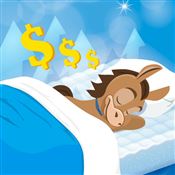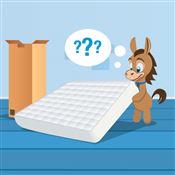Why Mattresses are Expensive
Some mattresses are only $200, while others are as expensive as $5,000. What's the deal? Find out how much a good mattress really costs.
 |
A mattress isn't exactly a high-tech gadget. But it can cost as much as an iPhone or MacBook!
Is it really worth shelling out thousands of dollars for a hunk of fabric and coils? If you've ever woken up with a stiff neck or sore back, you know how important a good night's sleep is.
There's a good reason for their top-shelf price point. Find out the 6 biggest reasons for high mattress cost and how to tell if you're getting ripped off.
6 Reasons Why Mattresses are Expensive
That hunk of foam and coils you sleep on every night? There's more that goes into it than meets the eye. While mattresses may look similar, how they're made and where they're sold have a big impact on price.
1. Higher quality materials
Not every mattress costs $1,000 or more. Some mattresses cost less than $200. While a cheap mattress can do in a pinch, it probably won't last very long.
Durable materials are more expensive for the manufacturer, and you'll pay more for them in turn. Here's what goes into each mattress type that drives prices up (from cheapest to most expensive):
Memory foam
Foams play a big role in comfort. A quality memory foam mattress will most likely have dense foam. Denser foams last longer, offer more support, and cost more than flimsy foams.
What counts as high density depends on the type of foam. Polyurethane foam with a density rating of 1.5 to 1.8 lbs/ft are better quality. Flimsy mattresses will usually be rated at 1.3 lbs/ft or lower.
Memory foam is denser in general. Look for a rating of 4.0 lbs/ft or higher for a good quality mattress.
Innerspring coils
Not all innerspring mattresses are created equal. Coil type affects your sleeping experience:
- Pocketed coils: adapt to your body; individually wrapped in fabric
- Traditional coils: eventually squeak and sag when they wear down
How coils are made also affects their quality and price. The cheapest method involves electric shocking to make harder, less flexible coils. The pricier method involves baking steel wire to create springy, durable coils.
The thickness of the wire matters too. Thick wires are more durable and supportive.
Latex
Latex is made from the sap of the rubber tree. The whole process from tree to mattress costs a lot and takes a lot of time. So, you'll typically pay $2,000 or more for a natural latex mattress. The good news is latex mattresses are super durable—some last up to 20 years.
| Mattress Type | Low | Average Cost (Queen) | High | Lifespan |
|---|---|---|---|---|
| Memory foam | < $900 | $900 | > $900 | 10 years |
| Innerspring | < $950 | $950–$1,000 | > $1,000 | 8 years |
| Hybrid | < $1,200 | $1,200–$1,650 | > $1,650 | 10 years |
| Latex | < $1,500 | $1,500-$2,000 | > $2,000 | 10–15 years |
Cover material
Ever feel like your bed is actually a sauna? Your mattress might have a low-quality cover. High-quality mattresses use breathable fabrics to create a cool, comfortable sleep surface.
2. Physical stores cost more to run
You'll most likely pay more at a physical mattress store than you would online. Physical retailers need to pay for the cost of the showroom, floor staff, and more. Online stores cut out some of these costs, so they're able to sell similar products cheaper.
To cover all these costs, it's common for physical stores to mark up their prices by as much as 100%. That's a huge profit margin. To put it in perspective, the average net margin for web retailers like Amazon is as low as 0.5% to 4.5%.
The brands commonly sold in mattress stores can also cause some issues. These brands slightly change the style of their mattresses, then sell them under different names at different retailers. It makes it harder for the buyer to comparison shop and get a good deal.
3. They last a long time
Mattresses last around 10 years. For an item that you use every single day for hours at a time, the cost is actually pretty reasonable. A $1,000 mattress comes out to about $0.27 per day.
Over the course of 10 years, other big-ticket items like a car or phone might even break down multiple times. Mattresses, on the other hand, are generally dependable.
And since sleep is crucial for good health, investing in a mattress is money well spent.
4. There's no second-hand market
Most people don't want to buy a used mattress. Too many cooties.
Because there's no used market to undercut new mattress prices, there's no reason for companies to lower their price. They know customers will buy anyway for the peace of mind of a fresh mattress.
5. Special features
Mattresses can come with lots of bells and whistles. Some mattresses offer adjustable firmness with a push of a button. Some are completely customizable and ergonomic for your body.
These features can be great choice if you have the extra money. But you don't have to pay a lot to get a good mattress.
The truth is, most people sleep the best on a medium-firm mattress. Anything extra is nice, but it's not necessary for restful and restorative sleep. If you're not sure whether a mattress you're considering is fairly priced, don't miss the tips below.
6. Extra costs and fees
You're not just paying for the cost of materials when you buy a mattress. Here are some other hidden costs that make mattress shopping expensive:
Sales Tax
Depending on which state you live in, sales tax can have a big impact on how much your grand total will be.
The top 3 states with the highest average combined sales tax are Tennessee, Louisiana, and Arkansas. On the flip side, Alaska, Delaware, Montana, New Hampshire, and Oregon have no sales tax at all.
Recycling Tax
Some states also have a recycling tax that's tacked on to every mattress. It costs $11 in California, $10 in Rhode Island, and $9 in Connecticut.
Shipping or Return and Fees
Many mattress companies only offer free shipping to the contiguous U.S. If you live in Alaska or Hawaii, you may have to pay $100 or more to get your mattress.
Companies might also charge you for returns, regardless of where you live. Makes sure to check fees so you don't run into any surprises down the road.
White Glove Delivery
Free basic delivery to your door is common for online mattress companies. But some companies offer white glove delivery. This includes old mattress removal and setup for your new mattress. This usually costs an extra $100 or more.
How to Tell if You're Overpaying
Mattresses are good investments and for a great night's sleep, they're worth every penny. But who wants to pay more than you have to? Here are 3 tell-tale signs that you're getting ripped off for your new bed.
1. Your mattress feels light
A heavy mattress may be difficult to carry, but that's actually a sign of good quality. Quality mattress materials like dense foam, thick coils, and natural latex weigh a lot.
If your expensive mattress feels lightweight, it could be a sign that the manufacturer skimped out. Light mattresses usually have flimsier foams and coils, so they should be relatively cheap.
2. You didn't haggle
If you're shopping in store and you don't negotiate the price, you're probably overpaying. Mattress retailers expect you to haggle, so their initial price is marked up by quite a bit.
Try to do a bit of research on similar mattress models beforehand. You can bring in prices from competitors to see if the store will beat the price. Even if they can't bring the price down any lower, you'll could get some freebies thrown in.
Not a pro at haggling? Here are 3 tips to negotiate your way the best possible price:
- Be prepared to walk away
Most stores can either match or beat a competitor's price. But if your salesperson isn't budging, don't be afraid to just walk away. There are plenty of other stores that will work with you. - Negotiate on more than just price
A good deal isn't just about getting the lowest price. You can also haggle for delivery fees, old mattress removal, free pillows, and more. Anything related to the mattress sale is fair game for negotiation. - Be friendly to the salesperson
A little kindness can go a long way. Of course, you want to be firm. But remember that you're talking to a real person who's just doing their job. Rude customers don't typically get the best favors.
3. You can't find the same model at a different store
Comparison shopping is the best way to get a good deal. Mattress manufacturers do not want you to do this. So, they make it as hard as possible for you to compare prices.
The same mattress could have different names at Mattress Firm and Macy's. If a buyer doesn't know a ton about mattresses, they might not know how to negotiate a better price. The practice is pretty shady, and it's all an attempt to get you to pay more.
Bottom Line
So, are expensive mattresses really worth it? It's best to avoid the cheapest mattresses for longevity's sake. But once you start spending more than $1,000, most special features don't add to the durability of the mattress.
Paying more can be a good idea if there are specific features you must have. If you want an organic mattress, for instance, that's a great reason to shell out a bit more.
But if you just want a comfortable mattress that won't give out on you prematurely, you don't have to spend $2,000 or more. Pay attention to your bed's support and how you feel in the morning instead.
Donna Tang is a content associate at CreditDonkey, a mattress comparison and reviews website. Write to Donna Tang at donna.tang@creditdonkey.com. Follow us on Twitter and Facebook for our latest posts.
Note: This website is made possible through financial relationships with some of the products and services mentioned on this site. We may receive compensation if you shop through links in our content. You do not have to use our links, but you help support CreditDonkey if you do.
Not sure what mattress is right for you?
Answer a few short questions in our mattress quiz to receive tailored recommendations.
|
|
| ||||||
|
|
|













